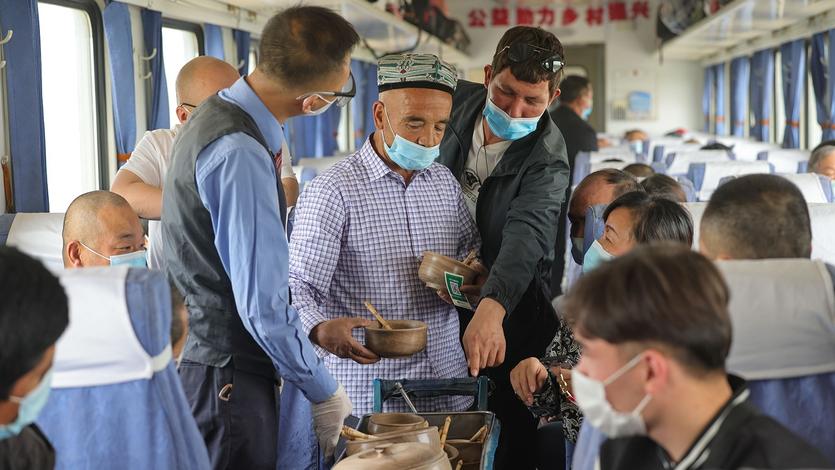 A craftsman offers wood handicrafts to train riders in the Xinjiang Uygur autonomous region in April. The train, which has a top speed of around 60 km/h, while bullet trains go over 300 km/h in China, connects northern and southern Xinjiang and is enjoyed by local residents. (DING LEI / XINHUA)
A craftsman offers wood handicrafts to train riders in the Xinjiang Uygur autonomous region in April. The train, which has a top speed of around 60 km/h, while bullet trains go over 300 km/h in China, connects northern and southern Xinjiang and is enjoyed by local residents. (DING LEI / XINHUA)
China has taken pre-emptive measures, which include improving the education system and tightening security, to ensure that people in the Xinjiang Uygur autonomous region live in peace and harmony without having to fear terrorist attacks. Western countries, including the US and some European states, have also been the targets of terrorist attacks. And like China, they too have adopted preventative measures to combat this menace.
It is every country's priority to eliminate terrorist threats. Yet when Western countries take preventive measures, they are regarded as national security measures and when China takes similar actions, they are considered an act of "genocide". While the entire world has been calling for an end to religious extremism and terrorism, the West has chosen to single out and condemn one country for doing so. The level of hypocrisy is truly mind-boggling.
Instead of admitting that they have levelled false accusations against China, the Western media has tried to instil in people the belief that China is deliberately obscuring facts and portraying a picture of harmony
The United States, Canada and the United Kingdom are among the most vocal proponents of such claims, asserting that China's actions amount to genocide. But regardless of how many attempts they make, truth will always prevail.
The Western world believes that by raising human rights concerns and hyping up the genocide rhetoric, it can jeopardize Xinjiang's stability, harmony and development. But attempts to demonize Xinjiang have proved futile and will continue to be so. Such nefarious actions serve to expose the West's underlying motives. In Xinjiang, the Uygur population has been continuously increasing. According to official statistics, the population of Xinjiang increased dramatically from 1953 to 2020, with the Uygur population surging from 3.6 million to more than 11.62 million.
In addition, the advancement of healthcare facilities in Xinjiang has resulted in a significant reduction in the death rate. The average life expectancy in the region grew from 30 years in 1949 to 74.7 years in 2019. While absolute poverty has been eradicated in the region, per capita disposable income of both urban and rural residents increased by more than 100 times, from 1978 to 2020.
Xinjiang has also implemented a multilayered social security program with the aim of improving its residents' well-being, including establishing an education system that covers all levels of education, extending healthcare to even the remotest areas, and ensuring job seekers of all ethnic groups get equal opportunities. The authorities have also taken measures to conserve the cultures of all ethnic minorities. While intangible cultural heritage items of all ethnic groups in Xinjiang have been included in the national and regional lists, 133 significant cultural heritage sites have been given State protection.
Furthermore, religious freedom is protected throughout the region. For example, there are 24,400 mosques in Xinjiang, that is, one mosque for every 530 Muslims. In fact, Xinjiang has more than twice as many mosques than those in the US, the UK, Germany and France put together.
Equally significant is the region's safety and security. People's lives and property are duly protected, allowing all ethnic groups in Xinjiang to peacefully pursue a better life for themselves and their children.
The Xinjiang regional government's framework and peaceful relations among different ethnic groups have facilitated rapid economic success in recent years. China's policies of promoting ethnic peace include guaranteeing equality and religious freedom, and taking a tough stance against religious extremism.
The West's allegations of genocide run counter to the region's economic development. The allegations could be a ploy to draw China's attention away from Xinjiang's development and ease its anti-terrorism policy.
As an old adage goes, to know whether the shoes fit, ask the wearer. Xinjiang residents are more knowledgeable than anyone else about the human rights situation in the region. "My achievements are inseparable from the learning opportunities, scientific research platforms, and policy support provided by the government over the years," said Nurzahat Habibul, who grew up in a rural family in Xinjiang and is now an associate professor at Xinjiang Normal University.
More than 2,000 government officials, religious personnel and journalists from over 100 countries and organizations have visited Xinjiang in recent years, and seen for themselves how a peaceful and harmonious Xinjiang is progressing steadily.
Xinjiang is "a land of prosperity, a land where people enjoy their rights and the rule of law", said Victor Cadena, vice-president of the Mexican Chamber of Commerce in China. All of the West's false claims are disproved by such undeniable facts.
For years, allegations of human rights violations in Xinjiang have been circulating in the Western media but none has been substantiated by facts. Instead of admitting that they have levelled false accusations against China, the Western media has tried to instil in people the belief that China is deliberately obscuring facts and portraying a picture of harmony.
The unsuccessful quest of the West to find proof of genocide, forced labor, concentration camps and other human rights violations in Xinjiang is reminiscent of the search in Iraq for weapons of mass destruction.
Is the West genuinely seeking the truth? Or, is it more engaged in inventing it?
The author is the founder of Save HK and a central committee member of the New People's Party.
The views don't necessarily reflect those of China Daily.


